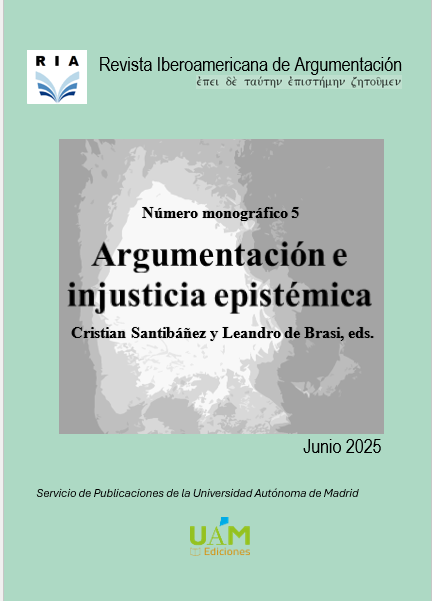Palabras clave:
argumentación, creencias, epistemología, injusticia epistémica, SimionDerechos de autor 2025 Bondy Patrick

Esta obra está bajo una licencia internacional Creative Commons Atribución-NoComercial-SinDerivadas 4.0.
Resumen
Este artículo presenta un problema relacionado con la injusticia hermenéutica que se fundamenta en un fallo en la fundamentación epistémica. Mona Simion ha defendido recientemente una ampliación del concepto de injusticia hermenéutica de Miranda Fricker para que abarque los casos en los que los sujetos tienen buenas razones para tener creencias importantes, pero no logran formular las creencias pertinentes. Este artículo sostiene además que las injusticias hermenéuticas pueden surgir en casos en los que los sujetos tienen buenas razones disponibles y sostienen las creencias pertinentes que se sustentan en esas razones, pero no logran sostener sus creencias sobre la base de las buenas razones que tienen a su disposición.
Descargas
Citas
REFERENCES
Almassi, B. (2018). Epistemic Injustice and its Amelioration: Toward Restorative Epistemic Justice. Social Philosophy Today 34: 95–113.
Audi, R. (1986). Belief, Reason, and Inference. Philosophical Topics 14 (1): 27–65.
Bondy, P. (2010). Argumentative Injustice. Informal Logic 30 (3): 263–278.
Bondy, P. (2016). Counterfactuals and Epistemic Basing Relations. Pacific Philosophical Quarterly 97 (4): 542–569.
Carter, A. & Bondy,P. (2018). The Basing Relation and the Impossibility of the Debasing Demon. American Philosophical Quarterly 55 (3): 203–215.
Carter, A. & Bondy, P. (2020). The Superstitious Lawyer’s Inference. In Carter, J. Adam, and Patrick Bondy (eds.), Well-Founded Belief: New Essays on the Epistemic Basing Relation, 125-140. New York: Routledge.
Dotson, K. (2011). Tracking Epistemic Violence, Tracking Patterns of Silencing. Hypatia 26 (2): 236–257.
Evans, I. (2013). The Problem of the Basing Relation. Synthese 190: 2943–2957.
Falbo, A. (2022). Hermeneutical Injustice: Distortion and Conceptual Aptness. Hypatia 37: 343–363.
Fricker, M. (2007). Epistemic Injustice: Power and the Ethics of Knowing. Oxford: Oxford University Press, 2007.
Hookway, C. (2010). Some Varieties of Epistemic Injustice: Reflections on Fricker. Episteme 7 (2): 151–163.
Henning, T. (2021). “Don’t Let Your Mouth”: On Argumentative Smothering Within Academia. Topoi 40: 913–924.
Lehrer, K. (1971). How Reasons Give Us Knowledge, or the Case of the Gypsy Lawyer. The Journal of Philosophy 68 (10): 311–313.
McKinnon, R. (2016). Epistemic Injustice. Philosophy Compass 11 (8): 437–446.
Plantinga, A. (1993). Warrant: The Current Debate. Oxford University Press.
Pohlhaus, G. Jr. (2012). Relational Knowing and Epistemic Injustice: Toward a Theory of Willful Hermeneutical Ignorance.’ Hypatia 27 (4): 715–735.
Simion, M. (2020). Hermeneutical Injustice as Basing Failure. In Carter, J. Adam, and Patrick Bondy (eds.), Well-Founded Belief: New Essays on the Epistemic Basing Relation, 177-189. Nueva York: Routledge.
Ye, R. (2020). A Doxastic-Causal Theory of Epistemic Basing. In Carter, J. Adam, and Patrick Bondy (eds.), Well-Founded Belief: New Essays on the Epistemic Basing Relation, 15-33. Nueva York: Routledge.
